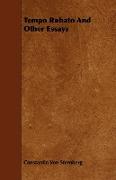Tempo Rubato and Other Essays
BücherAngebote / Angebote:
There is in musical terminology no word under cover of which quite so many sins are committed as under tempo rubato. Chopin deservedly receives the credit for having discovered it, but many who thus credit him hold very strange ideas about it. There are those who suffer with a technic too unreliable to keep them steady in prolonged rapid passages and when they run away with the tempo they palm their weakness off as tempo rubato. Then there are those who believe that the use of tempo rubato begins with the works of Chopin and that it must not be employed in any music written before him. There are also the arch-pedants who insist that tempo rubato not only begins but also ends with Chopins compositions. All of which is, of course, pure cant, the bulwark of ignorance and bigotry. If Chopin coined the term tempo rubato, his coinage was certainly not particularly happy he could scarcely have hit upon words more ambiguous and less descriptive of their object. With freedom of time tempo libero, vacillating or wavering time tempo vacillando, or undecided time tempo indecison would have done as well and would have been more easily understood by nations that do not speak Italian, of which-by the way-Chopins knowledge was very limited. Above all, however, a clearer term would have prevented that occultism, that mystery, with which so many people still connect the tempo rubato. It is amusing to note that even some serious persons express the idea that in tempo rubato the right hand may use a certain freedom while the left hand mustkeep strict time. See Niecks Life of Chopin, 11, p. 101. A nice sort of music would result from such playing Something like the singing of a good vocalist accompanied by a poor blockhead who hammers away in strict time without yielding to the singer who, in sheer despair, must renounce all artistic expression. It is reported by some ladies that Chopin himself gave them this explanation, but-they might not have understood him as well as did Wilhelm von Lenz, to whom he said Sup pose a piece lasts so and so many minutes if only the whole lasts so long, differences in the details do not matter. The two precepts are somewhat contradictory, but of that I shall offer an explanation a little later and shall mark it with an asterisk I well remember an old gentleman, a Pole, whom I met in Paris many years ago, and who in his younger years had piano lessons from Chopin. He talked scarcely of anything else than tempo rubato the compositions of Chopin were to him only the raw material to which the tempo rubato was to be applied. He described it as unfathomable, inexplicable, and then talked for an hour explaining it. The trouble was only that, as often as I met him, the explanation was never the same, until one day he capped the climax by saying with a sigh Ah, my young friend, no one but a Pole understands the tempo rubato that is why only a Pole can play Chopin, and of all the Poles there is really only one-but, come to think of it, no-no-he cannot, either Such mystery-mongering is, of course, pure tommy- rot as much so as some of the gushing melliflux about it in which some of Chopins biographers have indulged...
Folgt in ca. 10 Arbeitstagen
